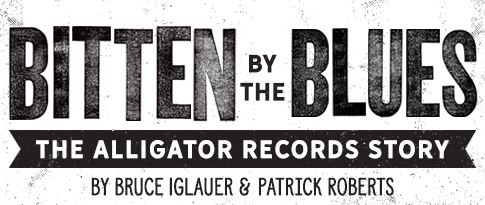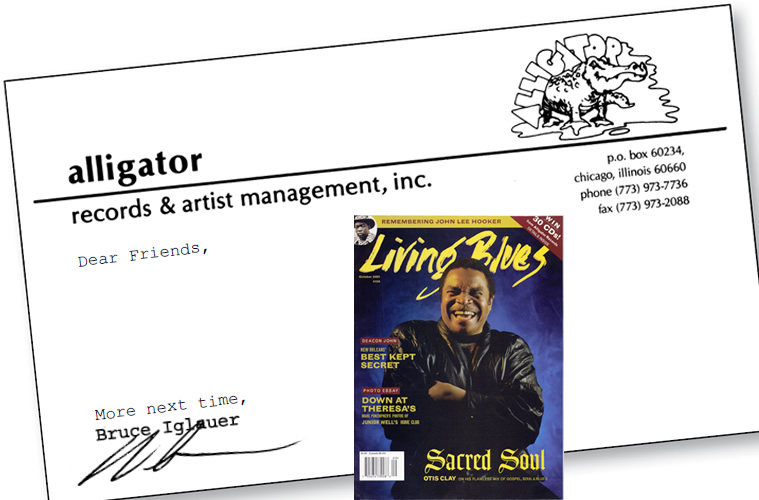Dear Friends,
As the summer of our 30th year comes to an end, we’re celebrating with the release of the Alligator Records 30th Anniversary Collection. It’s the successor to our very popular 20th and 25th Anniversary Collections and like those two, it’s two CDs for the price of one. But this time one disc is all studio material and the other is live recordings, including five previously unreleased tracks, plus a never-before-available CD-ROM video of Alligator’s original houserocker, Hound Dog Taylor! It’s the perfect blues gift (for yourself or anyone else). If you’d like to know more, you can check us out online at www.alligator.com, or see our ad elsewhere in this issue of LB.
It’s been a tough year for the blues record business, and for the entire record industry. Between absorption of small record store chains by three huge conglomerates, the rampant closing of independent stores, the competition from other forms of entertainment and the proliferation of music theft in the form of illegal downloads and CD burning, the whole U.S. record industry is down about 8% from a year ago. In the blues business, where labels like Alligator operate on tiny profit margins, this is pretty devastating. I know that a lot of music fans have disdain for the record labels, because they’re portrayed as money-hungry ripoffs. But the reality is that labels, large and small, are the financiers who make it possible for artists to be heard, to get on the radio and to build a fan base. And if you’ve heard that labels don’t pay artists–well, I just got done paying six months of royalties–about $250,000. So when you ask your friend to burn a copy of his CD for you, or you download a ‘shared’ song file for free, remember that it’s not only the label, but also the artist and the songwriter, who are getting ripped off. And they’re getting ripped of by you. If things keep going in the direction they’re going now, you’ll see less record labels and less artists being recorded, including less blues artists. Cannonball Records just folded, and I expect more labels to follow. This is a very scary time for those of us dedicated to getting the blues onto records.
But enough grumbling. I promised to write about the recording of Lonnie Mack’s Alligator debut, Strike Like Lightning. The genesis of that album was a visit in the early ‘80s by my boyhood Cincinnati friend, Ben Sandmel (known as a music journalist, drummer and now small label owner/producer). Although Lonnie had ‘broken’ nationally out of Cincinnati with a series of bluesy rock ‘n’ roll 45s in the early ‘60s, I wasn’t very familiar with his music. Ben came over to my house one afternoon with virtually every record Lonnie had ever made. I quickly realized that Lonnie was a very, very soulful singer and had a totally unique, aggressive guitar style with a piercing vibrato attack. The next time I went back home to Cincinnati to visit my mother, I found Lonnie gigging at a funky roadhouse near Hamilton, Ohio. He was playing for a tiny crowd, but his music was full of fire and energy and soul, and I was enthralled. The sound that came from his Gibson Flying V naturally bridged the gap between blues, rock and country (all the musics that Lonnie grew up with in southern Indiana). It wasn’t the kind of musical synthesis that comes from studying records. Instead, it was the creation of a man who started out country fingerpicking like Merle Travis, but fell under the spell of the blues, learning from a local black farmer. And Lonnie’s vocals? The best way to describe them is to tell you is that his two biggest vocal influences are Bobby Bland and George Jones. And that one of his early singles on the Fraternity label got a ton of radio play on southern R&B stations before the DJs found out that he was a white guy! It was hard to believe an artist this good was unsigned.
I heard Lonnie again at a club called Coco’s in Covington, Kentucky, the night that Muddy died. We got pretty drunk together and we shook hands on an album. But it was a couple of years before we actually recorded. That’s because Lonnie pulled up stakes and moved south to Austin at the urging of a young protégé who idolized him–a guitarist named Stevie Ray Vaughan. It was Stevie who made Strike Like Lightning finally come together. I’ll tell you how next time.
Bruce Iglauer

